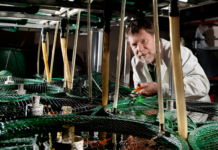One morning a few weeks ago, I woke up thinking maybe we should begin to think of reforms in mental health systems as a kind of “green movement” with some striking similarities to the other greens: the green environment, a green economy, green energy, and so on. The upcoming Mad in America Continuing Education series intends to use that as a framework for the ten webinars we will launch soon. More on that in a bit, but first, some quick background is in order.
An early leader of the Modern Green Movement was Rachel Carson, whose book Silent Spring (1962) laid out the dangers of detrimental effects to the environment caused by the indiscriminate use of pesticides. She made accusations against the chemical industry of spreading disinformation and public officials of accepting these claims. These accusations could just as easily be applied to the cozy relationships between the pharmaceutical industry and the major psychiatric organizations as documented in Robert Whitaker and Lisa Cosgrove’s Psychiatry Under the Influence (2015).
A half century ago, commercial and guild interests began to influence leadership and eventually take over mainstream mental health systems. This view has saturated public opinion to the degree that if you ask the average person in the grocery store, they will tell you that mental health problems are mostly chemical imbalances. If you ask many psychiatrists what people want when they come to see them, they will usually tell you people want the right medication.
As a counter narrative, I believe that understanding system change and reform in mental health with this “green” lens makes use of a powerful theme which is increasingly accepted and it lays out a road map to make innovative programs and initiatives the new norm for system-wide responses to mental health challenges.
Think of the following parallels between the perspectives of the green movements and what we are pointing to:
Addressing pollution. There is increasing evidence of psychiatric medications like antidepressants and benzodiazopines in water supplies. But the more significant problem is the presence of psychiatric drugs in the neurological systems of those who take them, especially over the mid to long term and in children and adolescents. This form of toxicity underlies the excessive tobacco usage and is a major factor in the 20-25 year loss of life expectancy in those prescribed these drugs for the most challenging problems and who take them over long periods of time.
Protecting nature. In our movement to reform systems of care, this would mean promoting good mental health—from simple exposure to the natural world to participating in healthy activities in the outdoors like walking, jogging, and hiking. It would encourage other natural ways of healing and reducing stress like yoga and meditation. It would make healthy (i.e. “green”) foods available rather than the artificial, high-calorie items that contribute to weight gain and other medical conditions.
Recognizing risks to financial sustainability. Green movements recognize that everything that harms the environment ultimately costs more in the long term. This is just as true of the increasing use and expenses of psychiatric drugs as well as the epidemic of disability caused in large part by the excessive and long-term use of these drugs. Unsuccessful treatments also result in the most expensive levels of care, like short-term and long-term psychiatric hospitals and restrictive intensive residential facilities. Finally, adding more and more diagnoses every year just adds to the use of drugs in more and more people.
Respecting the complex and interactive dynamics involved in harming and restoring the environment. This is also true in the complex world of mental health challenges. As in the natural world, there is increasing recognition of the many influences that lead to mental health challenges. These include reactions to trauma, social determinants of health, family communications, stressful school and work environments, bullying, alcohol and drug use, overuse of psychiatric drugs, involuntary treatments, discrimination, isolation, lack of safe affordable housing, the involvement of law enforcement, corrections and child welfare systems. There are many more. One prime example is the use of psychiatric diagnoses, especially those that are understood to be simply chemical imbalances and which therefore will last a lifetime. This supports the idea of “chronic mental illnesses” rather than recovery. Recognizing the complex and dynamic nature of the many interacting influences that impact mental health would lead mental health systems to more success in outcomes and would emphasize paths to recovery like trauma-informed care, supported employment and peer supports.
The upcoming Mad in America Continuing Education series starts in September and runs for ten months. I will start this series by introducing the green concept as a way to do system change and then turn it over to nine nationally and internationally respected leaders who will talk about their experiences doing this kind of change in their program or clinical specialty. These are not abstract theorists but people with real world seasoning. They will talk about what’s worked and what hasn’t worked with recommendations for advancing this green movement.
The presenters, dates and times for the “live” webinars are as follows:
Bob Nikkel, MSW: State Mental Health Commissioner (2003-2008) and Founding Board Member, Foundation for Excellence in Mental Health Care
September 17, 2019
What a Green Movement in Mental Health Means and how system changes can lead in that direction. The integration of Medicaid health care services in Oregon will be used as an illustration of what worked and what didn’t and why.
Robert Drake, MD, PhD, Andrew Thomson Professor of Psychiatry, Community and Family Medicine, and Health Policy and Clinical Practice at the Geisel School of Medicine at Dartmouth
October 15, 2019
Supported employment as a key to recovery in mental health and how it can be become an essential part of every mental health program
Michael Cornwall, PhD, Marriage & Family Therapist, Benicia, California
November 19, 2019
How counseling, family therapy and parent training can be provided in the most difficult public school systems in a way that makes referral for psychiatric medications completely unnecessary
Leah Harris, MA, Trauma-Informed Care Specialist and Coordinator of Consumer Affairs, National Association of State Mental Health Program Directors
December 17, 2019
A description of trauma-informed programs and how to make them the standard of care in every program from outpatient to residential to inpatient levels of care
Gina Nikkel, PhD, President and CEO, Foundation for Excellence in Mental Health Care
January 21, 2020
What real world experience has taught about making system changes at local, regional and state levels. A description of how partnerships, program ideas, budget development, legislation and advocacy come together.
David Hughes, PhD, President, Human Services Research Institute, Cambridge, Massachusetts
February 19, 2020
How to use research and a data-driven approach to support and guide system change based on decades of the Human Services Research Institute’s experience conducting system change activities for behavioral health systems.
Malcolm Aquinas, MAT CPSS LPE, Professional Consultant, National Center for Trauma Informed Care
March 17, 2020
Lessons learned in making program and institutional culture changes needed to respect human rights and dignity in state hospitals
Jennifer McClaren, MD, Assistant Professor of Psychiatry, Geisel School of Medicine at Dartmouth
April 28, 2020
A description of “de-prescribing” psychotropic medications to children and adolescents. How to develop these approaches in a systematic way with outpatient, inpatient and child welfare settings.
Kim Scott, MPP, President and CEO, Trillium Family Services
May 19, 2020
How a community program’s wide range of services for children, adolescents and families successfully transferred state hospital units to community residential programs, and lessons learned in what system changes were needed to accomplish that.
Laysha Ostrow, PhD, Founder and CEO, Live & Learn and Adjunct Professor, School of Community and Global Health, Claremont Graduate University
June 16, 2020
Peer services and the challenges and opportunities in making them an integral part of every mental health program. A description of the cultural, financial, regulatory and training changes needed to make these sustainable.
So that we can reach a broader audience to include more mainstream leaders, we will be giving members of national and statewide mental health program leadership organizations half off the registration fee—so it would be $75 for all ten 90-minute webinars. I expect to get 1.0 CE for each webinar for psychologists, social workers, nurses, licensed professional counselors and marriage/family therapists. As usual, we will also offer an early bird special plus some limited scholarships for individuals and organizations that cannot afford to pay the full $150 fee.
Please stay tuned for the official announcement and registration links. This series will be unlike any others in the past four years in its blending of program and clinical themes with how to change systems.















As a registered and active Green voter, I’m thrilled to see the connection you’ve made between Green environmental values and mental wellbeing, especially for kids. I have for a while been trying to make the connection between my politics and child/adult psych issues so that I can effectively advocate politically in this arena.
I’m not so thrilled with the idea of schools delivering parent training or family therapy, or any therapy. Schools are struggling hard enough to do the one thing they’re tasked with, and that has a lot to do with overburdening teachers and cutting arts/music/PE/recess and hyper focusing on academics. One really effective way to reduce disciplinary problems in the classroom would be to focus on making schools healthy environments for learning again. Give kids a break. Stop making them perform (work) for the school’s funding. Adding in any way to what teachers or other staff have to deal with in the pursuit of test scores is counterproductive.
Additionally, I think that schools often take an adversarial approach toward the parents – especially when it comes to medicating or otherwise targeting the child for treatments and I’m generally against anything that gives the education system more power to use with parents. A child’s teacher is not his third parent. Neither is the school counselor. I think the current CPS system should morph into a general Family Services department, and that receiving information from a child’s teachers could help inform Family Services on what help a child and family might need. But these things should not take place under the purview of the school system.
Overall, I also think that too much focus on being trauma-informed (after the fact) is going down the same rabbit hole as prior notions that some children were “culturally deprived”, lacked cultural capital, and just needed a little extra help, a la Head Start and early literacy programs in order to keep up with their better off peers. But what I’ve found through personal experience and observation is that what kids really need is food in their bellies, safe places to play and gather, love, attention and consistent expectations/rules, safe shelter to sleep, and parents who aren’t stressed from impoverished, abusive, or otherwise oppressive living/working conditions. And a lot of parents are aware of this too. Parent training? Well, that actually might have been helpful to the narcissistic dickwads I had for parents. But it can be really insulting to parents who deeply love and want to care well for their children but mostly lack resources, time and energy. Requiring those parents to spend extra time in counseling and training creates additional hardships for them. So I hope that these trauma-informed school-based approaches take all of these considerations into account. In my experience, these programs are often well-meaning but ultimately barking up the wrong tree and harmful, while stigmatizing and further stressing the parents who really want to be the best they can. Get into the home! Figure out what *supports* the parents need, not simply what program they have to attend and cooperate with. Formulaic approaches that look good on paper and generate funding are not necessarily the best way to help kids and families.
Still, I appreciate the effort, and am happy to see this. It would be lovely if our Green New Deal really did translate into a better environment for kids, at home, school, and beyond.
Report comment
what kids really need is food in their bellies, safe places to play and gather, love, attention and consistent expectations/rules, safe shelter to sleep, and parents who aren’t stressed from impoverished, abusive, or otherwise oppressive living/working conditions
Of course this is all true. It is also completely inconsistent with the needs of capitalism. The above article is oblivious to this very basic reality.
Report comment
Thank you oldhead, the above article is a horrid scam, trying to portray the living death of psychotherapy induced vegetative dishonor as somehow being “GREEN”.
Report comment
More Snake Oil, and always targeting survivors!
As people are starting to see the wrongness in the Biomedical Model, now we are being fed the Moral Superiority – FYOG model.
More people confessing to their Psychotherapists, and these people are never actually comrades. Their loyalty is to their sham profession and to its theories.
More people being made to believe fantasy concoctions about their own lives, minimizing the injustices they face in the present, pushing it off to the past where it is out of legal reach. Made to believe that the problem is with their very own life affirming aggressions.
More people so convinced that their own life affirmation is the problem, so that they are left with nothing to live for, except maybe for when they might be granted permission to die.
Deleuze and Guattari say that there is in fact only one mental illness, neuroticism. It is incurable, and it is fatal. And it is caused by Psychoanalysis and Psychotherapy.
Fortunately now in the US we have lawyers who are starting to sue, “Transference Abuse”.
https://www.wmlawyers.com/therapist-abuse-attorney-oakland/transference-counter-transference/
The more lawsuits we can file against psychotherapists the better. And the more of them we can put completely out of business the better. We should not let any of them ever have access to children without court supervision. And we should not be allowing our government to license them, as that only makes it worse.
Report comment
There can be nothing “Green” about anything labeled “mental health” — a concept that should logically be seen as offensive as “mental illness.”
And what happened to the conversation about putting such psychiatric/medical model terms in quotes at all times?
Report comment
We should by burying the Mental Health System, no further propagating it.
Report comment
We should be sending survivors to law school, not sending them to psychotherapists, as all that does is pressure them into accepting an honorless existence.
Report comment
Psychotherapists are government licensed thought control enforcers, trying to make everyone accept existence without honor.
Nothing green about it, rather the putrid smell of decomposing flesh and maggots.
Report comment
Psych drugs are pollutants, and they work against the healing processes of nature. I object to the term “mental health”, but I agree that the way to health is through going Green because toxic environments kill. Generate a health conscious public, and their “mental health” will take care of itself. Of course, this move requires a shift in thinking away from the gluttony of capitalism, and the negatives of a plutocratic oligarchy. Do something about global warming, and a lot of traditional businesses may suffer, but health is going to improve overall.
Report comment
Green is the color of plants, but it is also the color of money. We should not be helping to propagate the idea of psychotherapy as a remedy for social injustice. We should be sending survivors to law school and finding new ways to sue psychotherapists.
Report comment
We need to bury the mental health system. But it needs to be done in a chalk lined toxic waste facility.
Report comment
Yeah that pale green horse, the horse of death:
https://i.ytimg.com/vi/S91CG-JBWic/maxresdefault.jpg
Report comment